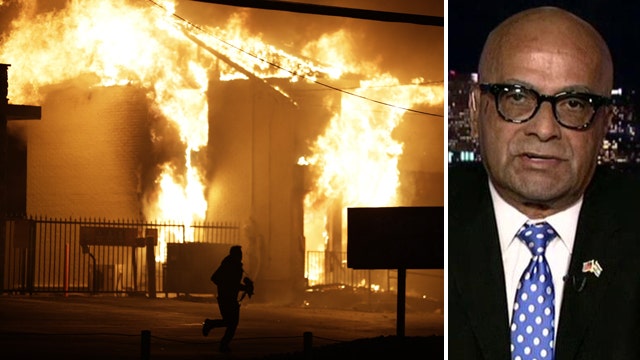Joe Hicks: 'Dr. King has got to be spinning in his grave'
Former civil rights leader on looting, vandalism following grand jury decision
This is a rush transcript from "The Kelly File," November 24, 2014. This copy may not be in its final form and may be updated.
MEGYN KELLY, HOST: In the meantime, we're joined by Ron Hosko, who's president of the Law Enforcement Legal Defense Fund and a former assistant director of the FBI and Joe Hicks, a former civil rights leader and vice president of Community Advocates.
Joe, let me start with you on the looting and the fires that are being set tonight as an expression, they say, of frustration with the system.
JOE HICKS, COMMUNITY ADVOCATES: Well, you heard someone behind the camera say this is justice. Somewhere Dr. King is probably an overused kind of notion here. But Dr. King has got to be spinning in his grave if that is what justice looks like. That tramples on the graves of all the old martyrs of the civil rights movement that really did struggle for real things, real racism, real issues they were trying to overcome.
And you've got thugs and punks and hoodlums in the street and you got somebody saying this is justice. This looks very familiar, what I remember in 1992 and again in 1965, when L.A. went through its big riots here, very similar kind of hooliganism and people looting and vandalizing stores and acting frankly like idiots.
KELLY: You know, Ron, as a police officer yourself, as somebody who's worked in law enforcement, your whole life, the people say they don't believe in the system. They say that the blacks are targeted more than whites are in Ferguson and they have got documentary evidence to prove it, in particular with respect to traffic stops. There have one, two, couple of incidents in the past involving questionable police behavior, in particular. What's cited by the media in the buildup to this case and they say they just don't believe that the prosecutor tried his hardest.
Your thoughts?
RON HOSKO, LAW ENFORCEMENT LEGAL DEFENSE FUND: I think we need some leadership to emerge from this situation. People who can talk to the mainstream within the African American community that can discuss the facts much like the prosecutor did tonight. I thought he gave a great civics lesson to the listeners and to the viewers.
But you need someone that is going to listen to that. That is our challenge is to find those leaders who can emerge and who can have this conversation and law enforcement leaders as well, that can regain the trust in these communities and have a conversation and somehow start fresh.
KELLY: You have got, Joe, Eric Holder coming out and saying, well, our own investigation at the DOJ is ongoing. It remains ongoing into this police officer and into the police department. And the president talking about how there is a deep distrust between law enforcement and the communities of color. And they're working to train law enforcement to be fair to everyone.
Your thoughts on that message?
HICKS: So when you get national leadership that buys into this kind of stuff that we're seeing on the screen, in a certain kind of way, with Obama saying we need police departments or police departments in Ferguson that reflect the racial makeup of that community. Well, what is he saying?
Do we need Asian cops to police Asian neighborhoods and Jewish cops to police Jewish neighborhoods? And black cops for only black?
This is a ludicrous notion that Obama presents here as well as him buying into the anger we're seeing here by saying we have to understand the anger of these rioters and looters and people who felt as if they didn't, quote, "get justice" tonight. Well, that is not helpful.
So we hear Mr. Hosko's notion of we need leadership. We do, in fact, need leadership but we're certainly not getting it from this administration and people like Holder and from Obama and we're certainly not getting it, frankly from major national civil rights figure who utilize this in terms of their agenda.
Now Mike Brown is going to reappear again in the pantheon of civil rights greats. He'll be installed right next to people like Rosa Parks and Martin Luther King and other greats. Imagine that. Trayvon Martin is also now a civil rights hero, spoken of in the same terms as Emmett Till.
KELLY: But Trayvon Martin wasn't doing anything wrong, but Michael Brown was. That's just --
HICKS: Well, he certainly wasn't performing any kind of courageous acts. That is what civil rights leaders did. You can't say Trayvon Martin did anything to be considered a civil rights leader or a heroic figure. Nor can you say that Michael Brown stealing cigars did.
KELLY: Joe and Ron, thank you both so much. I have to go. We'll be right back with more.
HICKS: Thank you very much.
Content and Programming Copyright 2014 Fox News Network, LLC. ALL RIGHTS RESERVED. Copyright 2014 CQ-Roll Call, Inc. All materials herein are protected by United States copyright law and may not be reproduced, distributed, transmitted, displayed, published or broadcast without the prior written permission of CQ-Roll Call. You may not alter or remove any trademark, copyright or other notice from copies of the content.





















